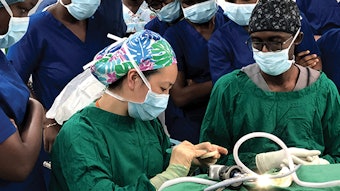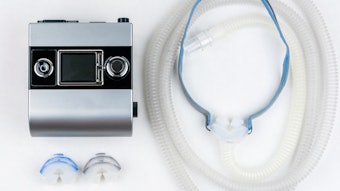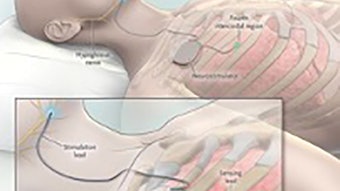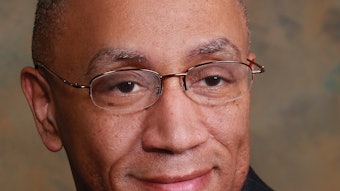Revolutionizing the Scope of Practice of Otolaryngology in Military Medicine
Dr. Joan T. Zajtchuk, COL (ret.) MC, U.S. Army, joined the American Academy of Otolaryngology–Head and Neck Surgery (AAO-HNS) when she returned from the Vietnam War in 1972. “My career trajectory in academic medicine after my residency was uncertain,” she explained. “A military career was unusual for a woman.
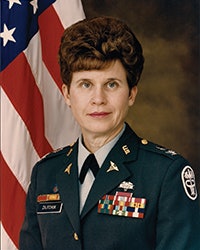 Dr. Joan T. Zajtchuk, Deputy Commander of Walter Reed Army Medical Center, Washington, DC, 1994. Photo by U.S. Army.
Dr. Joan T. Zajtchuk, Deputy Commander of Walter Reed Army Medical Center, Washington, DC, 1994. Photo by U.S. Army.Dr. Joan T. Zajtchuk, COL (ret.) MC, U.S. Army, joined the American Academy of Otolaryngology–Head and Neck Surgery (AAO-HNS) when she returned from the Vietnam War in 1972. “My career trajectory in academic medicine after my residency was uncertain,” she explained. “A military career was unusual for a woman. Women doctors were not drafted, so I had to volunteer. This carried a mandatory two-year contract. I joined the Army to be stationed in Vietnam along with my husband who also volunteered. To my knowledge, I was the only woman surgeon in the Army during the war.”
In 1967, Dr. Zajtchuk was also the first female otolaryngology resident selected by Dr. John Lindsay, then chair of the Otolaryngology Section at the University of Chicago. As a third-year resident, with a year and a half left to complete her training, she personally met with the president of the University of Chicago to help stop a move to jeopardize the school’s well-respected otolaryngology program.
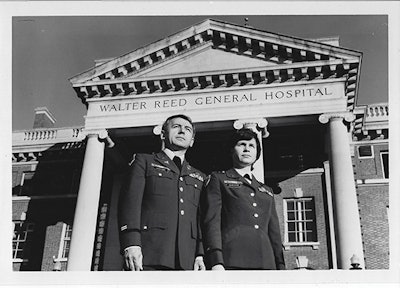 Dr. Russ Zajtchuk, BG (ret.), U.S. Army, and Dr. Joan T. Zajtchuk, COL (ret.) MC, U.S. Army, at Walter Reed Army Medical Center, Washington, DC, 1979. Photo by U.S. Army.
Dr. Russ Zajtchuk, BG (ret.), U.S. Army, and Dr. Joan T. Zajtchuk, COL (ret.) MC, U.S. Army, at Walter Reed Army Medical Center, Washington, DC, 1979. Photo by U.S. Army.“During this period, there was a bold political move by the Department of Surgery to divert trauma and head and neck tumor cases away from otolaryngology,” she said. “All residents were required to have a certain surgical case load at the end of their training; without that case load, the program would lose accreditation completely. Morale was quite low, so I decided to engage with the president directly. As you can imagine, quite a few comments were made about ‘this pushy woman resident,’ but I helped reverse the impending dissolution of the residency training program.”
In Vietnam, Dr. Zajtchuk was assigned to 24th EVAC Hospital in Long Binh and the 3rd Field Hospital in Saigon. “In my off-duty time, I did volunteer teaching at a hospital in Saigon, and worked closely with many civilian Vietnamese doctors. I received the Silver Health Medal from the Minister of Health of the Republic of Vietnam.
“My husband and I stayed in the military because of our war zone experience; we saw that we could provide service to our country. We realized the great sacrifices that were made by these young draftees, the young men who were fighting that war, and we appreciated their service to our country.” Dr. Zajtchuk’s husband is Dr. Russ Zajtchuk, BG (ret.), U.S. Army.
History of Women in Otolaryngology
The AAO-HNS has been working quietly behind the scenes over the past several months to curate a collection of artifacts and create a historic timeline showcasing the significant impact women have made in the specialty. This History of Women in Otolaryngology exhibit will reside in the John Q. Adams Center, the museum on the top floor of the Academy headquarters. A number of women pioneers in otolaryngology will be honored in the exhibit, including Joan T. Zajtchuk, MD, who has played an incredible role leading the Academy’s efforts in developing this exhibit. More information about this exhibit will be forthcoming.
Returning from service in Vietnam, she was assigned to Fitzsimons Army Medical Center in Denver as assistant chief, Otolaryngology Service, discovering that “there were less than one percent of women practicing in the specialty.” There, she was promoted to the rank of lieutenant colonel, and served as Assistant Clinical Professor of Otolaryngology at the University of Colorado School of Medicine.
In 1977, Dr. Zajtchuk was assigned to Walter Reed Army Medical Center in Washington, DC, where she would spend the next 17 years of her career. She was promoted to the rank of colonel, and held the positions of Chief and Program Director, Otolaryngology/Head and Neck Surgery Service, Department of Surgery (another first for women in military medicine); Professor of Surgery and Chair, Division of Otolaryngology, Department of Surgery and Associate Dean for Academic Affairs (Uniformed Services University of the Health Sciences) and Deputy Commander and Director of Graduate Medical Education; and much more.
Using her background in the military, Dr. Zajtchuk worked in countries around the world, particularly in Central and South America, to develop medical exchange programs for physicians and other personnel to train at Army Medical Centers in the United States. She commanded the medical element of Joint Task Force Bravo, the hospital caring for U.S. troops in Honduras, and helped establish the military humanitarian assistance program.
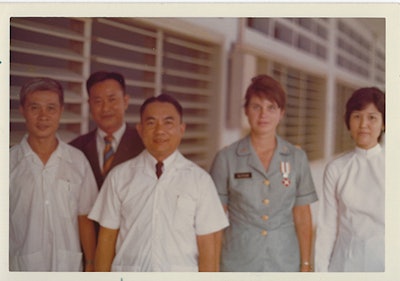 Dr. Joan T. Zajtchuk was awarded the Silver Health Medal by the Minister of Health of the Republic of Vietnam in 1972.
Dr. Joan T. Zajtchuk was awarded the Silver Health Medal by the Minister of Health of the Republic of Vietnam in 1972.“Now, whenever Armed Forces are deployed around the world, a medical element will deploy with them to conduct humanitarian assistance. We worked with doctors, nurses, dentists, even veterinarians to set up clinics in very remote areas to teach people about elementary healthcare needs. Had I not had that military experience, I could not have accomplished anything like this.”
Dr. Zajtchuk was an early innovator in the digital revolution. As Deputy Commander at Walter Reed in 1991, she developed the first telemedicine prototype that was soon adopted to provide tertiary care expertise for deployed Army troops worldwide. Her strategic vision—providing healthcare “anytime, anywhere”—became the template for the Triservice healthcare mission.
In 1994 she was named Special Assistant to the Army Surgeon General, and served a total of 25 years of active duty in the Medical Corps. At retirement in 1996, she was awarded the Distinguished Service Medal for her exceptionally meritorious service in positions of great responsibility. Returning to Chicago in 1998, she became Associate Dean, Medical Student Programs at Rush Medical College, and retired as Professor Emeritus, Department of Otolaryngology and Bronchoesophagology.
In addition to numerous civilian honors and appointments, Dr. Zajtchuk received the AAO-HNS Foundation Award for Distinguished Service in 1985, and the first AAO-HNS Humanitarian Award in 1990. She has been decorated for her service by the countries of Vietnam, Honduras, Poland, and Oman. Her U.S. military honors and medals include (but are not limited to):
- Distinguished Service Medal
- Legion of Merit with 1st Oak Leaf Cluster
- Bronze Star
- Defense Meritorious Service Medal
- Meritorious Service Medal with 1st Oak Leaf Cluster
- Army Commendation Medal
Throughout her career and particularly as Otolaryngology Consultant to the Army Surgeon General, Dr. Zajtchuk sought to expand the scope of practice within the specialty. “This was a time when our residency program directors nationwide were faced with another political battle to keep head and neck cancer surgery, facial plastic work, and thyroid surgery within our purview of expertise,” she explained. “Once again, I stood up for my specialty, at great risk to my career, to make certain that it was understood—and accepted—that we were the surgical experts in these areas and that they are an integral part of otolaryngology training and credentialing programs.”
As an AAO-HNS member, Dr. Zajtchuk served on the Government Affairs Committee, the Latin America Committee, and the Subcommittee on Appropriations, and recommends that new or young members join a committee. “Make your mark and volunteer. Look for a mentor, someone whose work you admire. It helps to have a champion to help get you to the right place at the right time. Establish networks and expand your opportunities about what’s possible.”
Looking back on her own career, she remarked, “As Deputy Commander of Walter Reed, I was rated by my abilities to command others, and I am proud to be the first woman in Walter Reed’s history to be selected for this position.”
Dr. Zajtchuk will be featured in the upcoming History of Women in Otolaryngology (WIO) Video Archive Project, a documentary of women in otolaryngology, celebrating the 10th anniversary of the formation of the Academy’s WIO Section.
